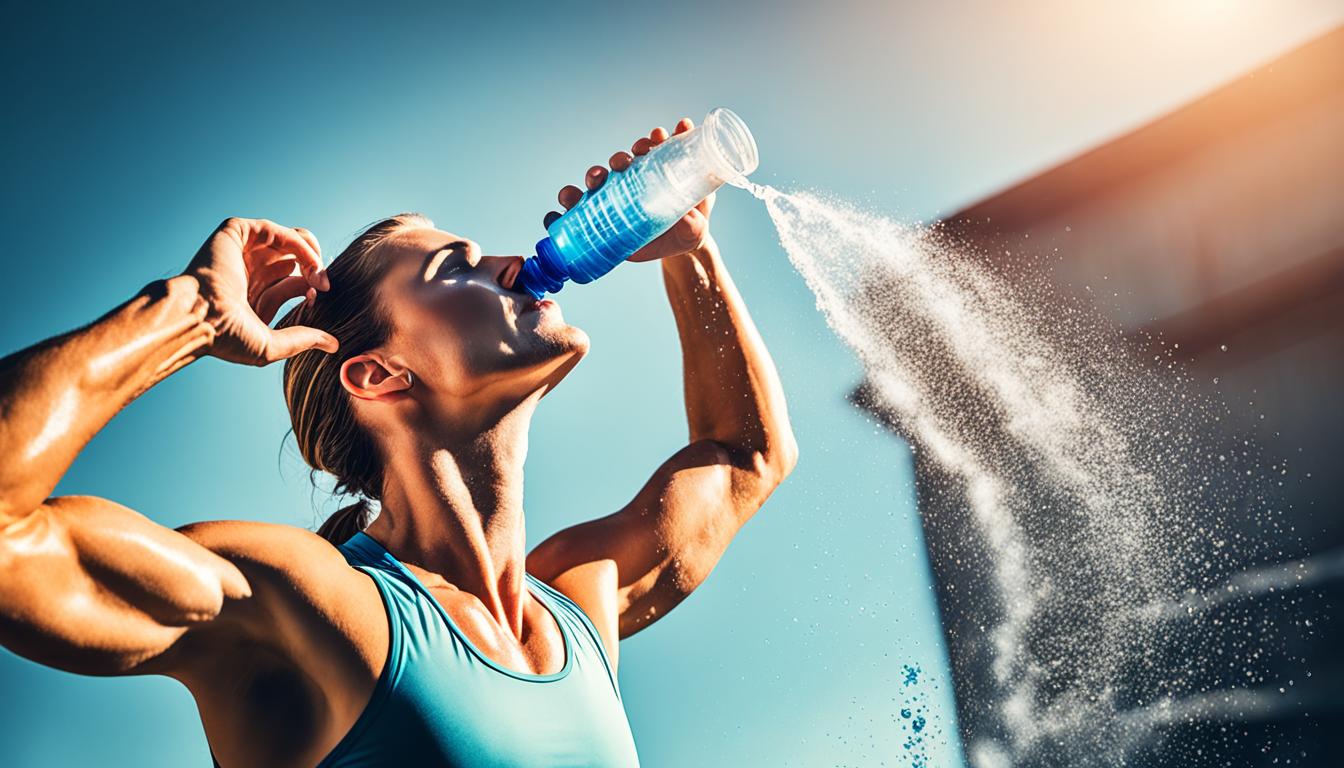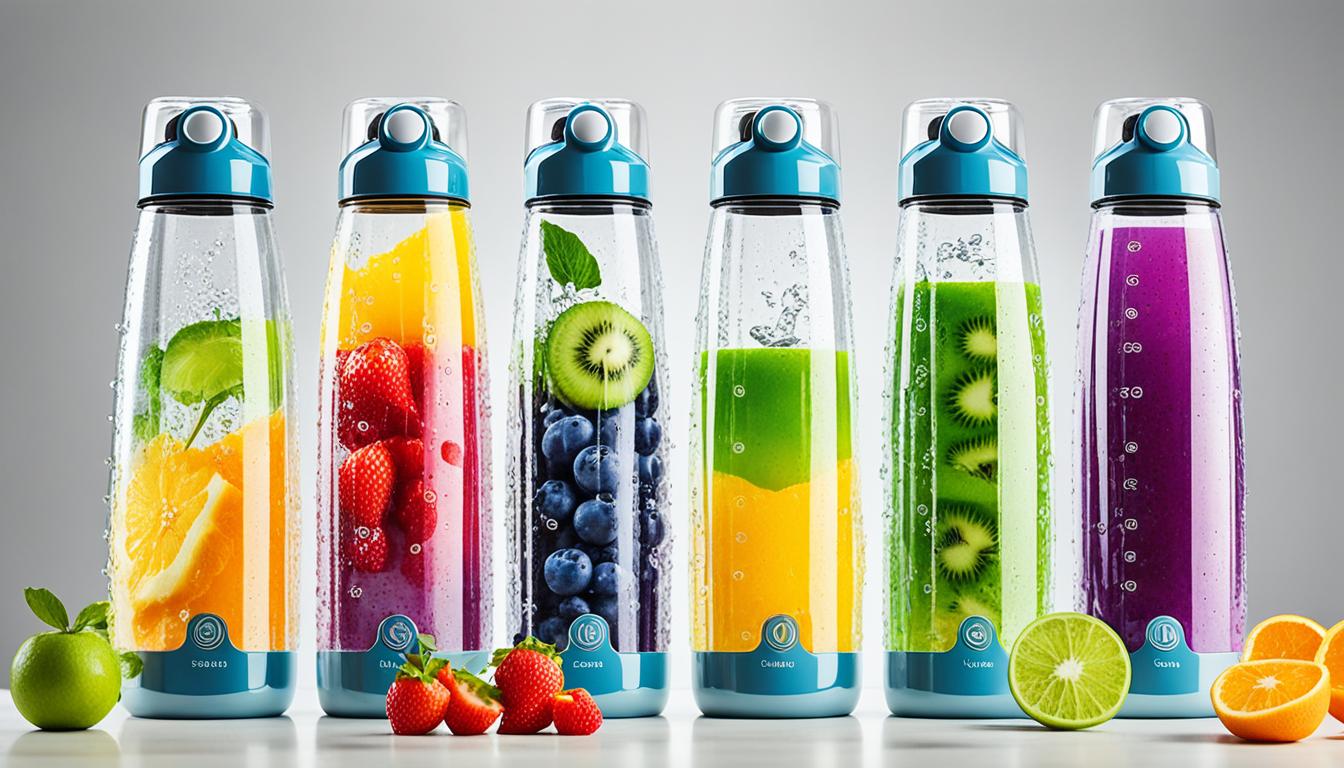Maintaining fitness is crucial for overall health and well-being. However, many individuals struggle to meet the recommended exercise targets. In fact, studies have shown that people in the UK are among the least active in the world, according to the World Health Organization.
Staying fit goes beyond just exercise – it also involves proper hydration. Being hydrated is essential for optimal performance and can significantly impact your fitness journey. Dehydration can lead to fatigue and hinder your ability to perform at your best during workouts.
In this article, we will explore the importance of hydration in fitness and provide valuable tips on staying hydrated during exercise. We will also discuss the role of motivation, overcoming obstacles, incorporating variety, and the importance of rest and recovery in maintaining fitness.
Key Takeaways:
- Staying hydrated is crucial for optimal fitness and performance.
- Dehydration can lead to fatigue and hinder your ability to exercise effectively.
- Drinking water before, during, and after exercise helps maintain proper hydration levels.
- Athletes can benefit from sports drinks that provide electrolytes and carbohydrates for longer or intense workouts.
- Motivation and overcoming obstacles are key to maintaining a consistent fitness routine.
The Importance of Hydration in Fitness
Hydration plays a crucial role in fitness. During exercise, the body loses water through sweat and breathing, making it important to replenish fluids to avoid dehydration. Staying hydrated helps regulate body temperature, lubricate joints, and deliver nutrients to the muscles. Proper hydration improves performance, reduces fatigue, and prevents muscle cramps and injuries. It is recommended to drink water before, during, and after exercise to maintain optimal hydration levels.

When you engage in physical activity, your body sweats to cool down, which leads to water loss. This loss of water can disrupt the body’s fluid balance and negatively impact your performance. By staying hydrated, you ensure that your body has enough water to support its functions during exercise.
In addition to regulating body temperature, hydration also helps lubricate your joints, reducing the risk of injuries such as sprains or strains. When your joints are adequately lubricated, they can move more smoothly, allowing you to perform exercises with proper form and technique.
Furthermore, staying hydrated ensures that your muscles receive the necessary nutrients to function optimally. Water helps transport nutrients to your muscles, aiding in their growth, repair, and overall performance. Proper hydration also supports your body’s energy production processes, helping to reduce fatigue and enhance endurance.
Incorporating enough fluids into your workout routine has several benefits. It improves your overall performance, allowing you to push harder and achieve better results. Staying hydrated also reduces the likelihood of experiencing muscle cramps, which can be painful and hinder your progress. By preventing dehydration, you minimize the risk of heat exhaustion and heatstroke, both of which can be dangerous.
Remember to drink water before, during, and after your workout sessions to stay adequately hydrated. Take regular sips of water or sports drinks to replenish the fluids you lose through sweating. Pay attention to your body’s signals, such as thirst or darker urine, which may indicate that you need to hydrate yourself.
Staying Hydrated for Optimal Performance
Athletes and fitness enthusiasts know that staying properly hydrated is essential for optimizing performance during workouts and training sessions. Hydration plays a key role in regulating body temperature, lubricating joints, and delivering essential nutrients to the muscles. To ensure you’re at the top of your game, it’s important to understand the best drinks for workout hydration, follow effective hydration tips for athletes, and learn how to optimize your performance with proper hydration.
Water is always the top choice for hydration, as it is calorie-free and easily accessible. It’s recommended to drink water before, during, and after exercise to maintain optimal hydration levels. However, for longer workouts or intense training sessions lasting more than an hour, sports drinks can be beneficial. These drinks provide electrolytes and carbohydrates, which help replenish energy stores and maintain fluid balance. Sports drinks can provide an extra boost when you need it most.
“Staying hydrated during exercise is crucial for avoiding fatigue, reducing the risk of muscle cramps, and optimizing performance.”
During exercise, it’s essential to drink fluids regularly to avoid dehydration. Aim to consume 7-10 ounces every 10-20 minutes to maintain proper hydration. It may be helpful to carry a water bottle with you to ensure you have easy access to fluids throughout your workout. Additionally, monitoring your urine color can serve as a simple indicator of hydration levels. Clear or light-colored urine is a sign of adequate hydration, while dark yellow urine indicates dehydration.

Proper hydration is not only important during exercise but also before and after. Before your workout, drink water to ensure you start off properly hydrated. After your workout, replenish fluids to rehydrate your body and aid in recovery. Remember, optimizing your performance with proper hydration goes beyond just drinking during exercise.
By following these hydration tips for athletes and incorporating the best drinks for workout hydration into your fitness routine, you can ensure that you’re performing at your best and achieving your fitness goals. Stay hydrated, stay energized, and enjoy the benefits of optimal performance.
The Role of Motivation in Maintaining Fitness
Maintaining fitness can be challenging, but with the right motivation, you can stay committed to your exercise routine and achieve your fitness goals. Motivation plays a crucial role in staying on track and making consistent progress.
One effective way to stay motivated is to find intrinsic motivation. Instead of focusing solely on external factors such as weight loss or appearance, concentrate on the immediate positive feelings that exercise brings. Exercise can reduce stress, boost energy levels, and enhance overall well-being. By tapping into these immediate benefits, you can stay motivated to continue your fitness journey.
Setting realistic goals is another key factor in maintaining motivation. Set specific, achievable targets that align with your fitness level and lifestyle. Break your goals down into smaller milestones, celebrating each achievement along the way. When you see progress and achieve your goals, it provides a sense of accomplishment and motivates you to keep going.
Incorporating enjoyable activities into your workout routine is also important for staying motivated. Find exercises that you genuinely enjoy, whether it’s dancing, cycling, or playing a sport. When you engage in activities you love, it doesn’t feel like a chore, and you’re more likely to look forward to your workouts.
Additionally, finding support and accountability can significantly boost your motivation. Partner up with a workout buddy or join group fitness classes to surround yourself with like-minded individuals who share similar goals. Having someone to exercise with or who can hold you accountable can provide the necessary encouragement and motivation to stay consistent.
Remember, staying motivated to workout is a journey, and it’s normal to have ups and downs. When you encounter obstacles or setbacks, remind yourself of the reasons why you started and the positive changes exercise brings to your life. Keep pushing forward, stay committed, and you’ll reap the rewards of a fit and healthy lifestyle.
“The key to staying motivated is finding intrinsic motivation and enjoying the immediate positive feelings exercise brings.”
Overcoming Obstacles to Exercise
Exercise is an important part of maintaining a healthy lifestyle, but various obstacles can sometimes get in the way of staying active on a regular basis. From time constraints to work stress, these barriers can make it challenging to prioritize fitness. However, it’s essential to find ways to overcome these obstacles and stay active despite the challenges.
One common obstacle to exercise is lack of time. Many people lead busy lives, juggling work, family, and other responsibilities. However, finding time for physical activity doesn’t always require hours at the gym. Consider incorporating short bursts of exercise throughout the day, such as taking the stairs instead of the elevator or going for a brisk walk during your lunch break. By making small changes to your daily routine, you can accumulate significant amounts of physical activity.
Another obstacle to exercise is fatigue. After a long day at work or taking care of household chores, it’s natural to feel tired and unmotivated to work out. However, physical activity can actually boost energy levels and help combat fatigue. Start with gentle exercises, such as yoga or stretching, to ease into a workout routine. Once you get started, you may find that your energy levels increase, making it easier to stay active.
“It does not matter how slowly you go as long as you do not stop.”
– Confucius
Work stress is another common barrier to exercise. When you have a demanding job, it can be challenging to find the motivation to work out after a long day. However, regular physical activity can help reduce stress levels and improve overall well-being. Try incorporating stress-reducing activities, such as yoga or meditation, into your exercise routine. These calming exercises can help you unwind and find balance amidst the demands of work.
Lack of support can also hinder individuals from staying active. Finding a workout buddy or joining a fitness community can provide the motivation and accountability needed to overcome this barrier. Additionally, seeking support from friends and family can make a significant difference in staying committed to your fitness goals.
Unfavorable weather conditions are another obstacle that can discourage exercise. Whether it’s extreme heat, cold, or rain, sometimes going outside for a workout may not be ideal. However, there are plenty of alternative options, such as home workouts or indoor activities like dancing or yoga. These can be done in small spaces and allow you to stay active regardless of the weather.
“The only bad workout is the one that didn’t happen.”
– Unknown
Overcoming obstacles to exercise requires planning and prioritizing fitness in your daily routine. Be kind to yourself and understand that progress is progress, no matter how small. Adaptation and flexibility are key in maintaining an active lifestyle, allowing you to overcome barriers and stay committed to your fitness journey.

The Importance of Variety in Fitness
Incorporating variety into your fitness routine is key to staying motivated and preventing boredom. Trying different activities and exercise modalities not only keeps things interesting but also challenges your body in different ways, leading to improved overall fitness.
When you engage in the same exercises day after day, your body becomes accustomed to the movements, and you may hit a plateau in your progress. By introducing variety, you can break through this plateau and continue to see advancements in your fitness levels.
One effective way to incorporate variety is through cross-training. Cross-training involves participating in multiple types of activities, such as cycling, swimming, and strength training. By cross-training, you work different muscle groups and improve your overall cardiovascular fitness.
Not only does cross-training enhance your physical fitness, but it also helps prevent injuries. When you engage in a single type of exercise repeatedly, you put stress on the same joints and muscles, increasing the risk of overuse injuries. Incorporating a variety of activities helps to distribute the load and reduce the strain on specific areas of your body.

“Mixing up my workouts has been a game-changer for me. Trying different activities keeps me excited and motivated, and I feel like I’m challenging my body in new ways. Plus, cross-training has helped me prevent injuries and keep my fitness journey enjoyable. I highly recommend incorporating variety into your fitness routine!” – Sarah, fitness enthusiast
The Role of Rest and Recovery in Fitness
Rest and recovery are crucial for optimizing your fitness results and promoting overall well-being. After intense workouts, your body needs time to repair and rebuild. Giving yourself adequate rest helps prevent overtraining and reduces the risk of injuries.
Incorporating rest days into your workout schedule is essential. Rest days allow your muscles and joints to recover from the stress of exercise, reducing the likelihood of overuse injuries. It also gives your central nervous system a chance to recharge, improving overall performance.
While rest is important, so is recovery. Prioritizing sleep is key in your recovery process. During sleep, your body produces growth hormone, which aids in muscle repair and growth. Aim for 7-9 hours of quality sleep each night to support your fitness goals.
Additionally, practicing specific techniques can enhance your recovery process. Stretching helps improve flexibility and range of motion, while foam rolling can release muscle tension and improve circulation. Mindfulness activities like meditation or deep breathing can reduce stress levels and promote relaxation.
By implementing rest and recovery strategies, you can optimize your fitness results and prevent burnout. Remember, fitness is a journey, and taking care of your body is just as important as working hard in the gym.

Conclusion
Staying fit and hydrated is vital for achieving optimal fitness results and maintaining overall health. By understanding the importance of hydration, staying motivated, overcoming obstacles, incorporating variety, and prioritizing rest and recovery, you can reach your fitness goals and enjoy a healthy lifestyle.
Consistency is key when it comes to fitness. Stay committed to your fitness journey, making exercise and hydration a regular part of your routine. Remember to listen to your body and adapt your workouts as needed to ensure long-term success.
Mindfulness plays a significant role in your fitness journey. Stay present and in tune with your body’s needs, adjusting your hydration levels and workout intensity accordingly. Everyone is unique, so focus on your individual needs and preferences to create a fitness regimen that works for you.
Take pride in your commitment to fitness and overall health. Enjoy the benefits of a fit and hydrated body, from increased energy levels and improved performance to better overall well-being. Embrace the journey, stay motivated, and make lasting changes that will lead to lifelong fitness success.
FAQ
Why is hydration important in fitness?
Hydration is important in fitness because it helps regulate body temperature, lubricate joints, deliver nutrients to the muscles, improve performance, reduce fatigue, and prevent muscle cramps and injuries.
What are the best drinks for workout hydration?
Water is the best choice for hydration, but sports drinks can also be beneficial for longer workouts or intense training sessions as they provide electrolytes and carbohydrates.
How much fluid should I drink during exercise?
It is recommended to drink 7-10 ounces of fluid every 10-20 minutes during exercise.
How can I stay motivated to exercise?
Finding intrinsic motivation, setting realistic goals, incorporating enjoyable activities, and finding support and accountability can help boost motivation and maintain consistency.
What are common obstacles to exercise?
Common obstacles to exercise include time constraints, fatigue, work stress, lack of support, and unfavorable weather conditions.
How can I overcome obstacles to exercise?
Overcoming obstacles requires planning and prioritizing exercise, being kind to oneself, and finding alternative options such as home workouts or activities that can be done in small spaces.
Why is variety important in fitness?
Incorporating variety into a fitness routine helps prevent boredom, keeps things interesting, challenges the body in different ways, and leads to improved overall fitness.
Why is rest and recovery important in fitness?
Rest and recovery are essential for allowing the body to repair and rebuild after intense workouts, preventing overtraining and injuries, and optimizing fitness results.
How can I optimize my fitness results?
By understanding the importance of hydration, staying motivated, overcoming obstacles, incorporating variety, and prioritizing rest and recovery, you can achieve optimal fitness results.
Source Links
- https://www.theguardian.com/lifeandstyle/2018/sep/12/how-to-stay-fit-for-ever-25-tips-keep-exercising-expert-advice
- https://www.livescience.com/how-to-get-fit
- https://openstax.org/books/college-success/pages/11-1-taking-care-of-your-physical-health


